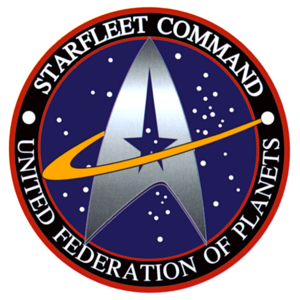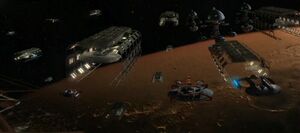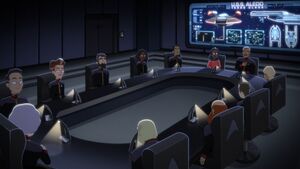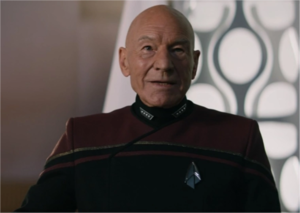Difference between pages "Fourth Fleet" and "Starfleet Admiralty Boards"
CrimsonTacit (talk | contribs) |
|||
| Line 1: | Line 1: | ||
{{ | {{Workinprogress}} | ||
}} | |||
{{icons|bfc|fed}} | |||
{{Organisation | |||
|name=Starfleet Admiralty Boards | |||
|image=[[File:Sfc.png|300px]] | |||
|founded= | |||
|affiliation=[[United Federation of Planets]] | |||
|headquarters= | |||
|primary mission=Oversight and Administration | |||
|location= | |||
|leadership= | |||
|flagship= | |||
|motto= | |||
|status=Active | |||
}}'''Starfleet Admiralty Boards''' are standing committees of both active duty and retired flag officers that provide effective oversight for Starfleet’s departments in conjunction with the commanders of fleets, directors of Starfleet bureaus, and other leaders. | |||
== Overview == | == Overview == | ||
While some aspects of Starfleet, such as its concept of the chain of command, derive from governmental, exploratory, and paramilitary antecedents, the concept of the admiralty board derives from the academic concepts of shared governance and peer review, which means that decisions about the validity of any course of action should be decided by both experts and stakeholders rather than unilaterally. For instance, the Chief of Starfleet Science has the authority to make snap decisions about Starfleet’s scientific operations, but those decisions are subject to the advice and consent of the Starfleet Science Board before they can become standing fleet-wide policies. This provides a measure of check-and-balance within the structure of Starfleet, though all Admiralty Boards are ultimately subject to the authority of both the Commander, Starfleet and the President of the United Federation of Planets. | |||
Each board has a chair and a vice chair; for department boards and yard boards, the chair and vice chair are the chief and deputy chief or commander and deputy commander of their respective department or yard. Flag officers tend to each serve on a handful of boards at any given time. The less important their day job is, the more boards they will serve on. Retired flag officers are often given several board assignments as well, if they want them. When necessary, fleet captains and captains may serve on admiralty boards, but this is considered unusual. | |||
Purely operational units, such as numbered fleets, task forces, task groups, and squadrons do not have admiralty boards attached to them, as they rely solely on the chain of command for decision-making. This is to ensure that a starship captain, a squadron commander, a task group commander, a task force commander, and a fleet commander each have one ultimate boss. However, each of these groups is part of a complex web of oversight originating from the department, shipyard, and class boards. | |||
== Types of Admiralty Boards == | |||
== | === Department Admiralty Boards === | ||
Each Starfleet department has a board, e.g. the Starfleet Medical Board, the Starfleet Communications Board, and the Starfleet Intelligence Board. These boards are primarily composed of former Chiefs and Deputy Chiefs of those departments, often three, four, or five-star admirals. These boards provide advice and consent for policy decisions related to these departments, alongside each department’s Joint Staff, meaning the leaders of its subordinate bureaus and offices. | |||
=== [[ | === Shipyard Admiralty Boards === | ||
[[File:Utopia Planitia Fleet Yards.jpg|alt=Every shipyard is a massive installation that requires significant oversight.|thumb|Every shipyard is a massive installation that requires significant oversight.]] | |||
Each Starfleet shipyard has a board, including Avalon Fleet Yards. These boards are composed of a mix of flag officers from all disciplines, who provide oversight of the shipyard’s construction, repair, and maintenance programs. Because it is impossible for a yard’s commander to oversee hundreds of projects simultaneously, each board member typically will be assigned a portfolio that includes several construction projects, repair projects, or other miscellaneous projects. The actual leaders of those projects will then provide regular updates to the board member, which allows the board to have a holistic understanding of the yard’s capabilities. | |||
=== | === Starship Admiralty Boards === | ||
'' | [[File:AdmiraltyBoard.jpg|alt=The California-class Admiralty Board in 2382.|thumb|The ''California''-class Admiralty Board in 2382.]] | ||
Each Starfleet starship class in service or in the design phase has a board, which is responsible for determining the policies for that class, ranging from maintenance manuals to training practices. They also have oversight of the captains of vessels of their class alongside their operational commanders. For instance, while the Director of Fourth Fleet Operations may appoint captains within the Fourth Fleet, these assignments could be countermanded by the relevant admiralty board. Admiralty boards also frequently inspect vessels under their purview. These boards are sometimes known as "fleet boards," as each class of ship could be considered to be a "fleet," though that is a different use of the term than is found in numbered fleets, like the Fourth Fleet. Each of these boards has a "fleet captain," who is a senior captain with experience commanding that ship class who provides administrative support to the board and insight—often, they also hold the ''rank'' of fleet captain. | |||
=== [[ | === Academy Admiralty Boards === | ||
[[File:Picard Uniform 2401.png|alt=Admiral Jean Luc-Picard (retired) serving as the Chancellor of Starfleet Academy.|thumb|Admiral Jean Luc-Picard (retired) serving as the Chancellor of Starfleet Academy.]] | |||
Starfleet Academy has its own oversight board, and so does each of its subsidiary campuses. These boards function similar to a Board of Regents, Governors, or Trustees for civilian universities, providing guidance for the Academy's superintendent and serving as the final step for any sort of appeal by a cadet or instructor. The chair and vice chair of the Starfleet Academy Board—which has direct oversight of the San Francisco Campus—are known as the Chancellor and Vice Chancellor of Starfleet Academy. The boards of smaller campuses simply call their leaders chairs and vice chairs. | |||
{{Clear}} | |||
== | == Admiralty Boards Relevant to the Fourth Fleet == | ||
Avalon Fleet Yards Board - provides oversight of Avalon Fleet Yards and supervision of its construction, maintenance, and research programs. | |||
Fourth Fleet Academy Board - provides oversight of the Fourth Fleet Academy. | |||
Revision as of 17:11, 20 September 2023

| |
| Starfleet Admiralty Boards | |
| Affiliation | |
| Primary Mission |
Oversight and Administration |
| Status |
Active |
| Template:Organisation | |
Starfleet Admiralty Boards are standing committees of both active duty and retired flag officers that provide effective oversight for Starfleet’s departments in conjunction with the commanders of fleets, directors of Starfleet bureaus, and other leaders.
Overview
While some aspects of Starfleet, such as its concept of the chain of command, derive from governmental, exploratory, and paramilitary antecedents, the concept of the admiralty board derives from the academic concepts of shared governance and peer review, which means that decisions about the validity of any course of action should be decided by both experts and stakeholders rather than unilaterally. For instance, the Chief of Starfleet Science has the authority to make snap decisions about Starfleet’s scientific operations, but those decisions are subject to the advice and consent of the Starfleet Science Board before they can become standing fleet-wide policies. This provides a measure of check-and-balance within the structure of Starfleet, though all Admiralty Boards are ultimately subject to the authority of both the Commander, Starfleet and the President of the United Federation of Planets.
Each board has a chair and a vice chair; for department boards and yard boards, the chair and vice chair are the chief and deputy chief or commander and deputy commander of their respective department or yard. Flag officers tend to each serve on a handful of boards at any given time. The less important their day job is, the more boards they will serve on. Retired flag officers are often given several board assignments as well, if they want them. When necessary, fleet captains and captains may serve on admiralty boards, but this is considered unusual.
Purely operational units, such as numbered fleets, task forces, task groups, and squadrons do not have admiralty boards attached to them, as they rely solely on the chain of command for decision-making. This is to ensure that a starship captain, a squadron commander, a task group commander, a task force commander, and a fleet commander each have one ultimate boss. However, each of these groups is part of a complex web of oversight originating from the department, shipyard, and class boards.
Types of Admiralty Boards
Department Admiralty Boards
Each Starfleet department has a board, e.g. the Starfleet Medical Board, the Starfleet Communications Board, and the Starfleet Intelligence Board. These boards are primarily composed of former Chiefs and Deputy Chiefs of those departments, often three, four, or five-star admirals. These boards provide advice and consent for policy decisions related to these departments, alongside each department’s Joint Staff, meaning the leaders of its subordinate bureaus and offices.
Shipyard Admiralty Boards
Each Starfleet shipyard has a board, including Avalon Fleet Yards. These boards are composed of a mix of flag officers from all disciplines, who provide oversight of the shipyard’s construction, repair, and maintenance programs. Because it is impossible for a yard’s commander to oversee hundreds of projects simultaneously, each board member typically will be assigned a portfolio that includes several construction projects, repair projects, or other miscellaneous projects. The actual leaders of those projects will then provide regular updates to the board member, which allows the board to have a holistic understanding of the yard’s capabilities.
Starship Admiralty Boards
Each Starfleet starship class in service or in the design phase has a board, which is responsible for determining the policies for that class, ranging from maintenance manuals to training practices. They also have oversight of the captains of vessels of their class alongside their operational commanders. For instance, while the Director of Fourth Fleet Operations may appoint captains within the Fourth Fleet, these assignments could be countermanded by the relevant admiralty board. Admiralty boards also frequently inspect vessels under their purview. These boards are sometimes known as "fleet boards," as each class of ship could be considered to be a "fleet," though that is a different use of the term than is found in numbered fleets, like the Fourth Fleet. Each of these boards has a "fleet captain," who is a senior captain with experience commanding that ship class who provides administrative support to the board and insight—often, they also hold the rank of fleet captain.
Academy Admiralty Boards
Starfleet Academy has its own oversight board, and so does each of its subsidiary campuses. These boards function similar to a Board of Regents, Governors, or Trustees for civilian universities, providing guidance for the Academy's superintendent and serving as the final step for any sort of appeal by a cadet or instructor. The chair and vice chair of the Starfleet Academy Board—which has direct oversight of the San Francisco Campus—are known as the Chancellor and Vice Chancellor of Starfleet Academy. The boards of smaller campuses simply call their leaders chairs and vice chairs.
Admiralty Boards Relevant to the Fourth Fleet
Avalon Fleet Yards Board - provides oversight of Avalon Fleet Yards and supervision of its construction, maintenance, and research programs.
Fourth Fleet Academy Board - provides oversight of the Fourth Fleet Academy.



